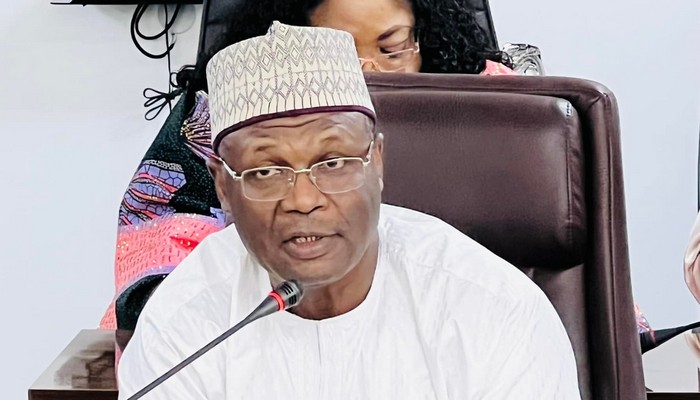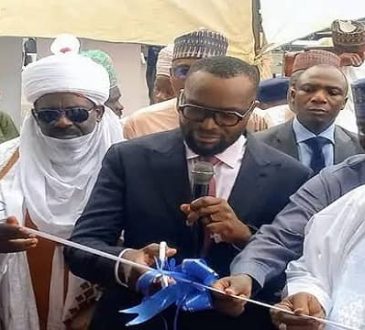Osinbajo advocates stronger regional cooperation, good governance to tackle terrorism, violent extremism

- Calls on member states to promote agreements, partnerships that bridge development gaps in the region
SPEECH DELIVERED BY HIS EXCELLENCY, PROF. YEMI OSINBAJO, SAN, GCON, VICE PRESIDENT OF THE FEDERAL REPUBLIC OF NIGERIA, AT THE 7TH MEETING OF THE MINISTERS OF DEFENCE OF MEMBER STATES OF THE COMMUNITY OF SAHEL-SAHARA STATES (CEN-SAD), IN ABUJA, NIGERIA, ON 21 JUNE 2018.
Protocol
It is a special pleasure to welcome you all to Abuja, on behalf of His Excellency the President and Commander-in-Chief of the Armed Forces of the Federal Republic of Nigeria, President Muhammadu Buhari, and the people and government of Nigeria.
Your presence at this all-important meeting, as participants, experts, speakers, and observers, is an indication of your individual and collective commitments to the aspirations and ideals of the Community.
Let me specially welcome the representatives of the United Kingdom, China, Saudi Arabia, and all Permanent Members of the United Nations Security Council, the representative of ECOWAS, as well as other nations and organizations with Observer Status; and commend you for your continuing support for CEN-SAD. We count on this cooperation and support well into the future.
The theme of the meeting, Consolidating the Achievement of the Fight against Terrorism through Development Actions, is especially apt, as it focuses attention on the role of non-military components of the fight against terrorism and extremism. If there is one thing we have learned from our experience fighting Boko Haram in Nigeria, it is that the battle is as much social and economic, as it is a military one. It was Mr. Ban Ki-Moon, former UN Secretary General who said famously, that “bullets may stop terrorists, but only development, good governance and respect for human rights can prevent terrorism.”
Indeed, the military aspect of the fight against terrorism is the short-term one; enduring victory will only come from swiftly and diligently building on military victory by implementing, over the long term, policies that comprehensively tackle the poverty, illiteracy and frustration that predispose individuals and communities to imbibing extremist beliefs and ideologies.
But the narrative is worsened by the fact that violent extremism and terrorism do not walk alone, they are usually to be found interlinked with human trafficking, drug trafficking, illicit trade in drugs and arms, and other various forms of transnational organized crimes.
Within the community, the security challenge has assumed new dimensions since the Arab Spring, with the collapse of the Gaddafi regime in Libya, proving to be a watershed moment. Countries like Mali, Burkina Faso, Niger and Nigeria, have since then, experienced an escalation of the twin global threats of violent extremism and terrorism, among others. This escalation of threats and vulnerabilities in the region has become an immediate and urgent security threat to the community.
But it is also encouraging to note that significant progress has been made to contain the terrorist challenges through the individual and collective actions of our respective States and through our respective regional economic communities.
The successes of the Multinational Joint Task Force (MNJTF) of the Lake Chad Basin Commission, in combating the Boko Haram menace in the sub-region, has significantly resulted in the degrading of the Boko Haram group in particular, in terms of membership, and of recruitment and combat capabilities. Similarly, the African Mission in Somalia (AMISOM), with the support of the United Nations and other strategic partners, has made impressive progress in the fight against Al-Shabab terrorists in Somalia and the Horn of Africa generally.
In this ongoing fight against terrorism and violent extremism, the importance of intelligence sharing by member states of the Community has come strongly to the fore, considering the achievements recorded by the Regional Intelligence Fusion Unit (RIFU) of the MNJTF, in the joint fight against Boko Haram, as well as the gains made through the Sahel Fusion Liaison Units, which have arisen from the Nouakchott Process and the Djibouti Process.
Also the countries of the Horn of Africa and East Africa have recently launched the East African Fusion Liaison Unit (EA-FLU) in Kampala, Uganda.
Besides, there have also been the Sharm-El-Sheik declaration of 2016 by the Community of Defence Ministers of CEN-SAD, reinforcing the cooperation of member states in the fight against terrorism and violent extremism and the Cocody Declaration which addressed inter-alia, the control and regulation of the movement of small arms and light weapons through the borders of member states.
But, your Excellencies, Honourable Ministers, as the theme of this meeting so clearly outlines, and as I mentioned earlier this is not a battle for militaries and intelligence agencies alone. If it were there would be no serious cause for alarm.
This is a fight that cannot and will not be won, without a collective and determined focus on all those elements that entrench poverty, want and conflict amongst the people of the Community, and that sow the seeds of criminal exploitation and violence.
These elements include the ecological threats of desertification and drought, as well as the phenomenon of forced human migration. Africa has historically been susceptible to desertification, due to the preponderance of semi-arid, arid and hyper-arid lands. Climate change and other factors collectively exacerbate these natural geographical conditions, to make more than 319 million hectares of Africa vulnerable to desertification.
In the CEN-SAD Community, the Sahara Desert is advancing southwards at an alarming rate of approximately 600 meters annually. A typical example is the shrinking of the Lake Chad due to climate change and human overuse. From about 25,000 square kilometers in 1963, Lake Chad, one of the world’s largest freshwater lakes, has shrunk by 95 percent to a current size of about 1,300 square kilometers. There are alarming predictions that the Lake may indeed, dry up completely in 20 years.
The Lake Chad Basin which straddles 4 nations in the Community previously supported more than 30 million inhabitants in its vicinity. The shrinking Lake Chad provides a graphic example of the notorious nexus between the environment and human conflict. There are strong indications that much of the violent conflicts in the Community can be linked to the passive and active resource conflicts associated with the shrinking Lake. People whose ancestors made a comfortable living off the land and water, as farmers and fishermen, are now confronted with displacement and vastly diminished opportunities.
In acknowledgement of this nexus, the Nigerian Government is spearheading a collective plan to recharge Lake Chad with water from the Congo Basin by constructing a 2,500 kilometers navigable channel from River Ubangi. This project requires unprecedented levels of political cooperation of member states of the Community, and technical collaboration and financial partnership, from international partners, governments, development institutions and investors.
The planned recharging of the Lake Chad is just one of the many serious interventions, to mitigate the worst effects of climate change in our region and on the continent. The great Green Wall, put forward as a pan-African initiative to combat desertification in the Community, is another such initiative, and it is wholly deserving of our support and praise. Under this initiative, trees are being planted in a land strip, stretching 7,775 kilometers across the entire region of Africa from Senegal to Djibouti, to stop the desertification.
Another serious contemporary security threat is the issue of forced migration of people from the Community. With over 13 million Internally Displaced Persons (IDPs) in 19 countries, Africa remains the continent most affected by internal displacement. Forced migration of people, particularly young people from member states of the Community to Europe through illegal, unregulated and highly risky routes, has lately become a serious, protracted and expanding global problem. That it is also big business for the powerful transnational criminal syndicates that organize it further, simply makes it more complicated.
We are confronted by the serious challenge of keeping our young people at home, and providing them enough social and economic opportunities, to deter them from falling for the false hopes of greener pastures as illegal migrants in distant countries.
Distinguished Guests, Ladies and Gentlemen, as governments, we have our work cut out for us. As leaders in the national and security and defence establishments in our member states, I urge you to promote the agreements and partnerships that will enable the Community fully bridge our development gaps, and meet the rapidly growing needs of present and future generations of our people. It is certainly in our collective interest, to act proactively in this regard, by enabling and catalysing the jobs and prosperity without which these battles cannot be lastingly won.
Finally, I wish you fruitful deliberations today and hope that at the end of the meeting, we shall have outcomes capable of bringing enduring peace, security and development to the CEN-SAD Community.
It is now my special pleasure and privilege to declare the 7th meeting of Ministers of Defence of Member States of the Community of Sahel-Sahara States open.
Thank you very much for listening.






